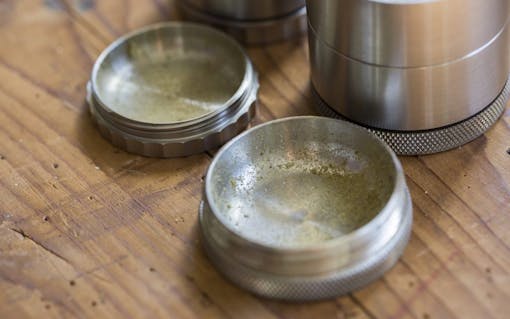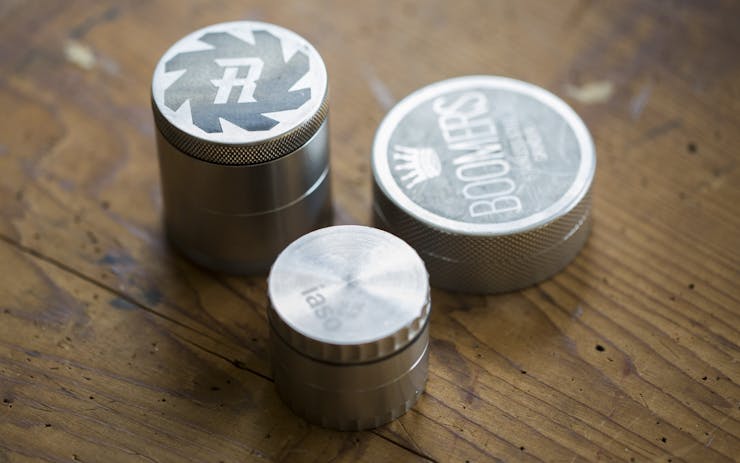A year ago, when I set out on a search for an herb grinder made of stainless steel, the only one I could find was designed primarily for grinding up pills. If you wanted to avoid aluminum—and I did, especially after noticing tiny slivers of metal in my grinder—your best options were coated aluminum grinders or those with certain components made of stainless steel.
Slowly but surely, that’s changing. Today there are at least three grinders—that’s right, three!*—constructed completely of stainless steel.
(Want to go directly to the reviews? Click here.)
What’s So Great About Stainless Steel?

The stainless steel Herb Ripper grinder, made in Cincinatti, Ohio. (Julia Sumpter/Leafly)
When I think about my kitchen, just about every metal utensil I use is made of stainless steel. The material is generally strong, long-lasting, and considered safe for food and other consumables. It’s also a breeze to clean up.
Much like how pesticides became a concern as legal cannabis markets opened, I expect the spread of legalization will lead to more questions about the materials used in accessories.
Go to a smoke shop, though, and nearly every grinder you’ll find will be aluminum, mostly because of cost. Aluminum is cheaper and easier to machine than stainless steel, allowing for faster manufacturing times and lower prices for consumers.
That doesn’t necessarily mean aluminum is the best choice, though. There are health issues to consider.
Research on the subject isn’t entirely consistent, but a 2016 meta-analysis found that individuals chronically exposed to aluminum were 71% more likely to develop Alzheimer’s disease. Much like how pesticides became a concern as states opened legal cannabis markets, I expect the spread of legalization will lead to more questions about the materials used in accessories.
That 2016 study worried me enough to start looking for other options. Which led me to steel.
Are there tradeoffs with stainless steel? Of course. It’s heavier and more expensive than aluminum. And because few manufacturers made grinders out of stainless steel, there are only a handful options to choose from. Luckily, that’s starting to change.
My (Unscientific) Testing Process
After gathering a handful of stainless steel grinders, I brought them to friends’ houses and work gatherings, encouraging others to use them as they would their own. In all, we probably ran a solid ounce of cannabis through each grinder, using flower of varying quality.
I also carried each grinder around in my backpack to get a sense of portability and durability. Then I made notes of what worked well and what didn’t, paying special attention to issues I’ve run into with other grinders.
As always, your mileage may vary.
The Grinders
The Herb Ripper (4-piece: $99, 3-piece: $80)

(Julia Sumpter/Leafly)
When I first started hunting for a stainless steel grinder, the Herb Ripper is close to what I had in mind. It looks like what you might expect a grinder to look like. No frills, no gimmicks. Pretty darn simple.
That simplicity may be the Ripper’s greatest strength. Made by a machinist named Kevin in Cincinnati, Ohio, the Ripper takes a tried-and-true design that should be familiar to most users and (finally!) makes it available in stainless steel.
Design
Despite the grinder’s simplicity, you’ll notice small, thoughtful details. The plastic O-ring, which in most cases I end up losing, is permanently connected to the grinder’s lid. The teeth have dull, pyramidal points that help push through tough nugs, but they’re not too sharp to go fishing for a stubborn stem with your finger. The bottom chamber, where the kief collects, has curved edges instead of squared ones, making it a little easier to scoop out every last bit of kief. And because it’s stainless steel, you can just toss the whole thing in a dishwasher if it gets dirty.

The four-piece Ripper comes with a stainless steel ball bearing that acts as a grinder coin. (Julia Sumpter/Leafly)
The Ripper also ships with a stainless steel ball bearing, meant to perform the function of a grinder coin—basically to jostle your flower’s trichomes through a screen and into the kief catcher below. If you’re someone who uses a grinder coin, the advantage here is that the ball bearing does the same thing but is made of stainless steel. If you’re not into it, no worries—just set it aside. Your grinder will work just fine without it.
Use
Grinding cannabis with the Ripper was a pleasure. Rotation is smooth, and it grinds flower to a consistent, fine texture. The 2-inch diameter is bit smaller than some mainstream grinders, but I found it worked fine for regular use and ends up saving some weight. If you grind a ton of cannabis all at once, you might want a bigger option.

Looking for a lighter, slimmer grinder? Both the Ripper (left) and Iaso grinder (right) are available in three-piece versions. You can also simply remove the kief catcher, as pictured. (Julia Sumpter/Leafly)
My only gripe with the Ripper is the threading. While the threads are cut deep and don’t clog with cannabis like some grinders I’ve owned, I sometimes have a tough time screwing together the pieces correctly. You know how sometimes a jar lid screws on at an angle and won’t go on all the way? I ran into the same thing with this grinder. It’s not a deal breaker for me, but it mars what otherwise might be my ideal grinder.
Where to Buy
The Ripper, which launched this past 4/20, is available via the manufacturer’s website. A four-piece Ripper retails for $109, though it’s currently on sale for $99. If you’re looking to save a few bucks, consider the three-piece version (regularly $95, on sale for $80), which removes the middle chamber and kief screen. (Unpopular opinion: I don’t find kief catchers all that useful anyway.)
TL;DR: If you’re looking for a stainless steel grinder for everyday use, this may be the best choice around. It’s sturdy, reliable, and comes in a size that should fit most users’ needs.
Iaso Goods (4-piece: $129.99, 3-piece $79.99)

The Iaso grinder features a channel around the grinding chamber, called a labyrinth seal, meant to prevent sticking, (Julia Sumpter/Leafly)
From what I can tell, Iaso Goods might just be the first commercial manufacturer to deliver a 4-piece grinder made of stainless steel.
Design
The first thing I noticed when I unboxed the Iaso grinder was its size. This thing is petite, with a diameter of just 1.75”. That’s only a quarter of an inch smaller than the Ripper, but it ends up feeling considerably smaller in practice. That small size makes it easier to carry in a purse or pocket, but it also means it can’t grind or carry as much cannabis as standard grinders. That’s no big deal if you’re using a one-hitter or a dry herb vaporizer like a Pax, but if you regularly roll blunts or go through larger amounts of cannabis, you might have to grind in multiple batches.
This is a handsome little grinder. The quality of construction is excellent. Parts fit together snugly and almost seamlessly, and the grinding teeth are surprisingly sharp. Like the Ripper, the Iaso grinder’s kief chamber has gently rounded corners (more like a saucier than a saucepan, if you know your cookware), and the mesh screen above the kief catcher can be replaced easily if it gets clogged or damaged. If your grinder gets too gunked up, the stainless steel components are dishwasher safe.

Both the Iaso grinder (left) and Ripper (right) have kief containers with rounded edges. (Julia Sumpter/Leafly)
The Iaso grinder’s most unusual feature is its labyrinth seal, which is intended to keep the two top sections from getting gunked up and sticking together. It’s a laudable attempt to solve a common grinder problem. But it also ends up making the grinder feel smaller, as the seal itself takes up the outer edge of the grinding chamber (as you can see in an above photo). The inner chamber, where the unground cannabis goes, ends up being about 1-3/8” in diameter.
For an extra $10, you can buy a fancy wood-and-steel box that doubles as a stash box. It’s pretty, but it doesn’t seem to be airtight. I’d prefer it have some sort of silicone seal around the outer edge (like my Kindtray), to keep cannabis fresh and prevent odors from leaking out.

Accidentally damage your grinder’s screen? Both the Iaso grinder (left) and Ripper (right) are built with a clip mechanism that allows for easy replacement. (Julia Sumpter/Leafly)
Use
I like the Iaso grinder a lot and currently use it as a backup. I really wanted to love it, but there a couple things got in the way.
First, the plastic O-ring that fits between the lid and the rest of the grinder is unsecured and pops off almost every time I remove the lid. It’s not an essential piece, but it helps the grinder spin more smoothly, and it’s frustrating that a $130 grinder would have such a basic design flaw. The company assures me that the O-ring on the next version of the grinder will have a securely attached O-ring.

The plastic O-ring that comes with the grinder isn’t attached and pops off easily. Be prepared to lose it. (Julia Sumpter/Leafly)
For me personally, the grinder is a bit too small. While it will carry plenty of ground cannabis for a joint or spliff, it’s hard to fit that much cannabis in the grinding chamber, in large part because of the labyrinth seal. This might not be an issue for those who need a small amount of cannabis at a time—it’d be a perfect complement to a one-hitter, for example—but I don’t want to have to grind two batches just to roll one joint. (Again, the company says a larger version is in the works.)
About that labyrinth seal: I’m no mechanical engineer, but my understanding of a labyrinth seal is that it’s supposed to be sealed in order to prevent particulates from gunking it up. That’s a great idea, given how some grinders tend to stick as they get dirty.

This cross-section of the Iaso grinder shows how the labyrinth seal was designed. (Courtesy of Iaso Goods)
The idea behind the labyrinth seal—which is a real thing in engineering, I learned—is to prevent the edges of the grinder’s two top sections, which rub against one another (these are called mating surfaces and are pictured in orange in the above diagram), from getting covered with sticky resin. Thus, the thinking goes, your lid will never stick.
That theory seems to hold so long as the grinder stays closed. As soon as it’s open, that cannabis particle no longer has to navigate the treacherous path out of the chamber and onto the mating surfaces—it just has to hop directly in the labyrinth seal. Does that happen? Absolutely. This spillover occurs in part because the grinding chamber is so small. I tried to keep particles clear of the labyrinth seal—really, I did!—but after about a month of use it looked like this:

Despite my best efforts, a good amount of cannabis ended up in the grinder’s labyrinth seal. (Julia Sumpter/Leafly)
To be fair, the grinder still hasn’t stuck. But neither has the Ripper, which has no special seal whatsoever.
On the fence? I think you’ll get good use out of the Iaso grinder, but personally I’m more excited about version 2.0, which will hopefully see some kinks ironed out.
Where to Buy
The Iaso grinder is available through the manufacturer’s website. A four-piece grinder retails for $129.99, while a three-piece goes for $79.99. A wooden “stash box,” which has a stainless steel interior, will set you back and extra $10. If you’re going for a super portable (and slightly more affordable) option, get the three-piece and skip the stash box. I don’t think it’s worth the extra $50 to add a kief catcher to such a small grinder, but that’s your call.
TL;DR: This is a beautifully crafted grinder for people looking for a smaller option, and it’s likely to last you a while. But the jury’s still out on the grinder’s killer feature, its labyrinth seal.
Boomers Grinder (2-piece: $95)

Weighing in at more than a pound, the two-piece Boomers grinder is built like a tank. (Julia Sumpter/Leafly)
I already reviewed the Boomers grinder, so I’ll try to keep things brief. This is a two-piece, ultrasimple grinder that is built like a tank and could probably double as a weapon. It’s about the size of a hockey puck and opens to reveal two sets of sharp, pointy teeth. Like, really sharp teeth. Be careful.
For some uses, the grinder might be very nearly perfect. A friend of mine grinds a bunch of cannabis into a rolling tray, then rolls multiple blunts to save for later. This might be good for that, as it will process a ton of cannabis in a hurry. For me, though—and, I’d argue, most casual consumers—it’s a poor fit. Because the ground cannabis remains in the grinding chamber, among all those pointy teeth, it’s difficult to pour directly into a joint and difficult to dig out with your finger. Need a pinch to put in the bowl of your bong? Don’t reach into the Boomers grinder! It works best if you grind everything up, then dump everything out.

Watch out! The Boomers grinder has the sharpest teeth of any grinder I’ve tried. (Julia Sumpter/Leafly)
If I were a budtender rolling hundreds of pre-rolled joints, this is the grinder I’d use. For personal use, though, I’ll stick with a three- or four-piece grinder.
Where to Buy
The Boomers grinder is available through Wacky Willys, a Victoria, BC–based website that sells all manner of cannabis-related equipment (plus other things, such as pill presses and, for some reason, fidget spinners). The site lists the Boomers grinder’s regular price as $149.99, but it’s been on “sale” for $95 for nearly a year now.
TL;DR: Want a two-piece stainless steel grinder that can cut through cannabis in a hurry? Buy this. If you’re looking for anything else, there are probably better options out there.
*OK, so there may very well be more than three models of stainless steel grinder out there, but these are the ones I could find (and I searched—exhaustively). Do you know of others? Please let me know in the comments. This is clearly becoming something of an obsession for me.





